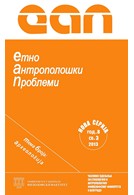Ogled iz teorijske arheologije: da li postoje arheološke kulture?
An Exercise in Theoretical Archaeology: Do Archaeological Cultures Exist?
Author(s): Marko PorčićSubject(s): Archaeology, Museology & Heritage Studies, Social Theory
Published by: Филозофски факултет, Универзитет у Београду
Keywords: archaeological theory; archaeological culture; typology; evolutionism;
Summary/Abstract: Archaeological culture still persists as a basic analytical and interpretative concept in Serbian archaeology despite criticism. This paper presents a formal view of archaeological cultures and explores the epistemological implications of this formalization. Formal analysis of archaeological culture is achieved through logical and quantitative explication of the traditional definition of archaeological cultures. The main result of the formal analysis is that there are real patterns of formal variability of material culture that may or may not correspond to traditional archaeological cultures. These patterns are real only in the analytical sense – they are real for given input data and scale of analysis. Unlike the traditional approach where this patterns are equated with archaeological cultures which are furthered interpreted in essentialist terms or as quasi-organic entities such as ethnic groups, it is claimed here that discovered patterns are only the starting point – the empirical situation that needs to be accounted for in anthropological an historical terms. This paper shows how patterns that are traditionally identified as archaeological cultures can arise as a consequence of an entire range of processes – different social and historical realities. The main conclusion is that the traditional concept of archaeological culture is not useful neither as analytical or interpretative tools for two reasons: 1) traditional cultures are subjectively defined entities with no theoretical justification for the criteria used in their definition and 2) the empirical pattern cannot be an explanation in itself because it is the thing that needs to be explained. Cultural evolutionary (transmission) theory is proposed as a general framework for defining and interpreting patterns of formal variability of material culture in time and space.
Journal: Етноантрополошки проблеми
- Issue Year: 8/2013
- Issue No: 3
- Page Range: 633-655
- Page Count: 23
- Language: Serbian

